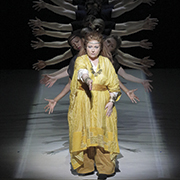The impact of Christoph Willibald Gluck’s operas, which cannot be over-estimated, is generally well-known. A series with four albums, arranged by vocal range, now makes his arias available for teaching and performance.
Christoph Willibald Gluck (1714–1787) is regarded as the great opera reformer of the mid-18th century. With Ranieri de’ Calzabigi he introduced a reform of Italian opera seria, realized in his Orfeo (1762). With Calzabigi and with support from the choreographer Gasparo Angiolini, he had already created Don Juan ou Le Festin de pierre a few months earlier, the first example of an action ballet. Influenced by the Dauphine and future Queen Marie-Antoinette, he settled in Paris in 1773. There, with the help of several librettists and translators such as Pierre-Louis Moline, François-Louis Gand Le Bland Du Roullet and Nicolas-François Guillard, he succeeded within a few years in transforming the genre of the French “tragédie en musique”. Gluck’s Iphigénie en Aulide (1774) was an even greater aesthetic shock for audiences than Rameau’s Hippolyte et Aricie had been in its day. When he set the whole of Philippe Quinault’s masterpiece Armide to music, supplanting Jean-Baptiste Lully’s music, he demonstrated the impact of his approach. With fewer than ten operas, which were performed at courts and in Paris between 1774 and 1779 – new compositions or arrangements, as in the case of Orphée et Eurydice (1774), Cythère assiégée (1775), L’Arbre enchanté (1775) and Alceste (1776) – Gluck helped French opera to make the transition to a new era. However, his style was accused of coldness and harshness by the supporters of Italian music, whose leading figures were Piccinni and Sacchini, giving rise to the quarrel between the followers of Gluck and Piccini (1778–79). In fact, Gluck affronted the audience at the Académie royale de musique by banishing the old practices dating from the 17th century, outdated from then on: the number of ballets was reduced, and they were integrated into the stage action. Recitatives were accompanied throughout and performed fluently and without ornamentation. The chorus was directly involved in the drama. The arias, either expressive cavatinas or fiery numbers, had an incredible expressiveness never before heard.
Gluck’s art was continued in Paris by some of his pupils, such as Lemoyne, Vogel and Salieri, and attracted widespread admiration until the middle of the following century, particularly from Hector Berlioz. If Gluck’s works disappeared from the repertoire at the Opéra in the mid-19th century, it was because they had become impracticable as a result of the raising of concert pitch and the increase in the size of concert halls and orchestras. Recognized once more in the second half of the century, thanks in particular to the efforts of Berlioz (who arranged Orphée et Eurydice in 1859 for the mezzo-soprano Pauline Viardot, combining the Vienna and Paris versions), Gluck’s French operas progressively regained their position in the repertoire at the beginning of the 20th century. They were translated into several languages and enjoyed great popularity, especially in Germany. Beethoven, Weber and Wagner, notably, regarded Gluck as one of the founding fathers of modern opera. But it was above all the baroque revolution of the 1970s, new interpretative approaches, and the use of historic instruments at authentic pitch which gave Gluck a new relevance. Performed nowadays on both modern and Baroque instruments, his French operas now command universal admiration and are amongst the most frequently-performed works of the late 18th century, alongside those of Mozart.
Since their composition in the 1770s Gluck’s French opera arias, such as “J’ai perdu mon Eurydice” (Orphée), “Divinités du Styx” (Alceste) and “Ô malheureuse Iphigénie” (Iphigénie en Tauride) have become indispensible pieces for singing lessons, concerts, auditions and, more recently, CD recitals.
For the first time, all these arias are now available as vocal scores in four collections, in two languages (Fr./Eng.), arranged by vocal range (soprano, dramatic soprano/mezzo-soprano, tenor, baritone), and in editions based on the Gluck Complete Works (Christoph Willibald Gluck, Sämtliche Werke, Bärenreiter-Verlag).
Benoît Dratwicki
(from [t]akte 2/2019 – translation: Elizabeth Robinson)



